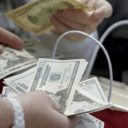
The Survey of Consumers final read on consumer sentiment for March fell from 101.0 to 89.1, the fourth largest decline in nearly a half-century and below the forecast.

The preliminary reading earlier in the month was 95.9. Forecasts ranged from a low of 80.0 to a high of 95.0. The consensus forecast was 92.0. Historically, the coronavirus-fueled level for the reading is still solid, but not for the Trump Administration, which has broken records.
The Consumer Sentiment Index fell 11.9 Index-points in March, rivaled only by the 12.7 decline in response to Great Recession in October 2008, and two declines of 12.2 points in response to the 1980 recession and Hurricane Katrina in September 2005.
“The Katrina decline was reversed within three months, and some observers compared that ‘V’ shaped economic episode to the expected impact of the coronavirus,” said Richard Curtain, chief economist for the Survey of Consumers.
“What didn’t show a ‘V’ shape response was the recovery of New Orleans, a closer comparison to today’s national economy.”
The 1980 and 2008 collapses in consumer confidence were followed by prolonged recessions.
A more comparable prior decline occurred in August 1990, when the Sentiment Index fell by 11.8 points due to the invasion of Kuwait, and subsequently recorded an all-time record gain of 17.3 points in March 1991. Those two outsized changes in the Sentiment Index defined the start and end of the 1990-91 recession. Just as in the 1990-91 episode, th
The Current Economic Conditions fell from 112.5 in the preliminary reading and 114.8 in February to 103.7. The Index of Consumer Expectations fell from 85.3 in the preliminary and 92.1 in February to 79.7.
“If the Consumer Sentiment Index were to stabilize at its most recent seven-day average, it would imply an additional decline of nearly 18.2 Index-points in April,” Mr. Curtain added.
That would result to a record setting two-month decline of 30.1 points. Stabilizing confidence at its month’s end level will be difficult for several reasons.
First, the bad news is not over. Second, unemployment and falling household incomes are surging.
In August 1990, when the Sentiment Index fell by 11.8 points due to the invasion of Kuwait, it posted an all-time record gain of 17.3 points in March 1991. That reversal marked the end of the 1990-91 recession.
“To avoid an extended recession, economic policies must quickly adapt to a new era that will reorder the spending and saving priorities of consumers as well as the relative roles of the public and private sectors in the U.S. economy,” Mr. Curtain concluded.





